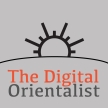
Komonjo Camera, the AI App for Reading Cursive Japanese Characters
Overview In June 2023, TOPPAN Corporation released an application for iOS, the Komonjo Camera 古文書カメラ. This was followed by an … Continue reading Komonjo Camera, the AI App for Reading Cursive Japanese Characters







